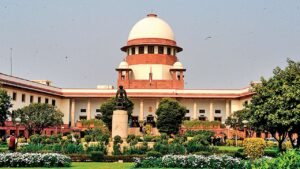The Supreme Court says that canceling a deed is a personal action, not a general one, and can be resolved through arbitration
Case: SUSHMA SHIVKUMAR DAGA vs. MADHURKUMAR RAMKRISHNAJI BAJAJ.
Coram: Justices Aniruddha Bose and Sudhanshu Dhulia
Case No.: CIVIL APPEAL NO.1854 OF 2023
Court Observation: “The Trial Court and the High Court have rightly held that the broad language of the “arbitration clause” in the two Tripartite Agreements dated 31.03.2007 and 25.07.2008 would cover the dispute raised by the appellants before the Civil Court, and hence the case has been rightly referred for arbitration.,”
“It is agreed between Parties that in the event of any disputes or differences between the Parties hereto in relation to this Agreement or in relation to any matter touching or arising from this Agreement, the parties shall refer such disputes and differences to the arbitration under the provisions of the Arbitration & Conciliation Act, 1996 or any statutory modification thereof.”
“The basic purpose for bringing an amendment in Section 8 (as well as Section 11 of the Arbitration Act) was to minimise the scope of judicial authority in matters of arbitration, except on the ground where prima facie, no valid arbitration agreement exists…. After the 2015 amendment, primarily the court only has to see whether a valid arbitration agreement exists.,”
“Nevertheless, the case before the Civil Court does not fall in any of the categories, visualised in either Booz Allen (supra) or Vidya Drolia (supra) referred above.”
“Except for making a bald allegation of fraud, there is nothing else. This Court has consistently held that a plea of fraud must be serious in nature in order to oust the jurisdiction of an Arbitrator.”
Previous Posts
Keywords
The Supreme Court says that canceling a deed is a personal action




